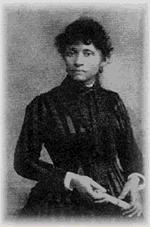Profile In Courage:
John Peter Altgeld & The Haymarket Pardons
By Robert Tabscott
ONE HUNDRED FOURTEEN years ago, May 4, 1886, a deadly confrontation between law-enforcement officers and protesters erupted in Haymarket Square in Chicago. A labor strike was in progress at the McCormick Reaper Works and several employees had been shot by police and Pinkerton Security enforcers at the plant.
A public demonstration was called to protest police violence.
Eye-witnesses later described a "peaceful gathering of upwards of 1,000 people listening to speeches and singing songs when authorities began to move in and disperse the crowd." Suddenly, a bomb exploded, followed by pandemonium and a withering exchange of gunfire. Seven policemen were killed. Scores of citizens were killed or wounded. Chicago was in turmoil.
The Chicago Tribune railed against "the McCormick insurrectionists" and their anti-American allies. Authorities hurriedly rounded up 31 suspects. Eventually eight known pro-union activists were indicted on charges of conspiracy and murder, "all with foreign-sounding names" as one newspaper put it: August Spies, Michael Schwab, Samuel Fielden, Louis Lingg, Albert Parsons, Adolph Fischer, George Engle and Oscar Neebe.
The trial was later shown to be riddled with abuse and judicial misconduct. No evidence tied any of the accused to the explosion of the bomb. Some of the men were not even at the rally. The eight were convicted and sentenced to death by hanging. There were no appeals.
Parsons, Spies, Engle and Fischer were quickly ushered to the gallows. Lingg committed suicide in this cell.
Meanwhile, as Fielden, Neebe and Schwab awaited their fate, Gov. Richard Ogelsby, who had privately expressed doubts "that any of the men were guilty of the crime," commuted their death sentences to life in prison.
There the matter smoldered until John Peter Altgeld, the first immigrant to be elected governor of Illinois, took the oath of office in 1892.
Altgeld was born in Germany in 1847. Shortly thereafter, the family settled on a hard-scrabble farm in Ohio. At the age of 15, he enlisted in the Union Army and fought under Gen. U.S. Grant's command. After the war he moved to Savannah, Mo., where he was admitted to the bar. In 1875, Altgeld moved to Chicago, where he emerged as a power in Illinois public life.
In 1886, he was voted to the bench of the Cook County Superior Court. Six years later, at the age of 48, he was elected governor with the support of labor and liberal intellectuals. Altgeld's future looked bright.
But within six months of his inauguration, Haymarket resurfaced. Pro-labor activists led by Clarence Darrow urged Altgeld to review the Haymarket case. He took the matter under personal advisement.
As one observer put it, Altgeld "saw an appalling abuse of justice, a violent incident fueled by inept police work, a series of flimsy murder charges that did not even pretend to be based upon direct investigation, a jury stacked with people who presumed the guilt of the defendants at the outset, a sham trial conducted with malicious ferocity."
Thus, he contended in his pardon of Fielden, Neebe and Schwab, "The deed to sentencing the Haymarket men was wrong, a miscarriage of justice. And the truth is that the great multitudes annually arrested are poor, the unfortunate, the young and the neglected. In short, our penal machinery seems to recruit its victims from among those who are fighting an unequal fight in the struggle for existence."
When he was done, he told his old friend, Clarence Darrow, "Pardoning those men will not meet with the approval that you expect; let me tell you that from this day, I am a dead man, politically."
He was.
When news of the clemency broke, reaction was immediate and damning. "What would one expect from a man like Altgeld," observed The Washington Post, "who is, of course, an alien himself?" And the Chicago Tribune concluded that "the governor had not a drop of true American blood in his veins. He does not reason like an American, does not feel like one, and consequently does not behave like one."
Three years remained in Altgeld's term and to his last day in office, he was spared no relief from political and public contempt for his courage.
As one critic has put it: "A century later, Altgeld's actions loom even larger in a day of poll-driven politicians too often dancing to the tune of lobbyists and campaign donors. Altgeld was no saint. He could maneuver and demagogue with the best of them . . . but behind those eyes beat a heart in tune with the aspirations of those on the outside, a heart that hated injustice, a heart with the courage to act."
Today, amid the debate over the death penalty, and the discovery of the increasing number of innocent prisoners put to death, the courage and example of John Peter Altgeld should at last be remembered proudly.
Robert W. Tabscott, a Presbyterian minister, heads the Elijah Parish Lovejoy Society, Glendale.
© 1999 St. Louis Post-Dispatch, postnet.com
Source:
More info about the Haymarket Affair...

